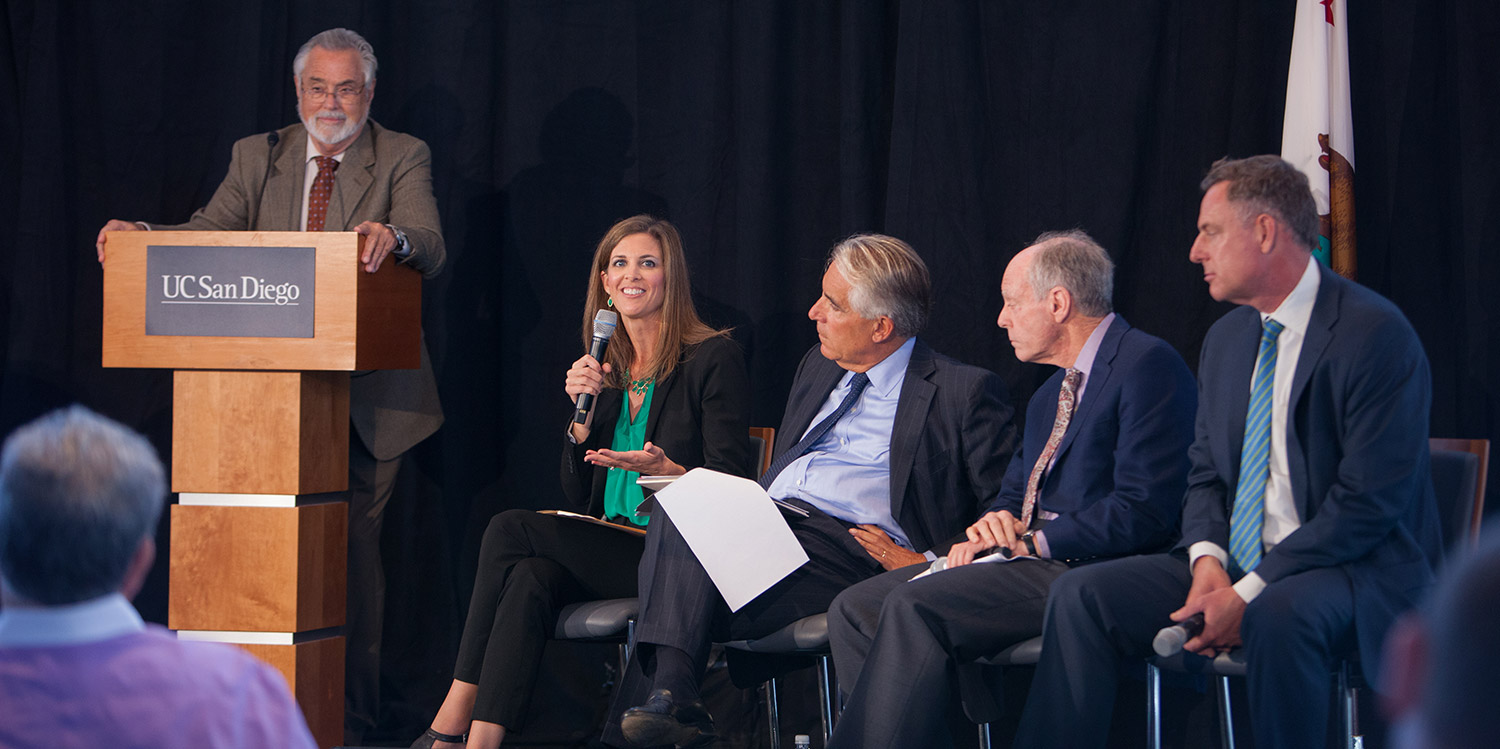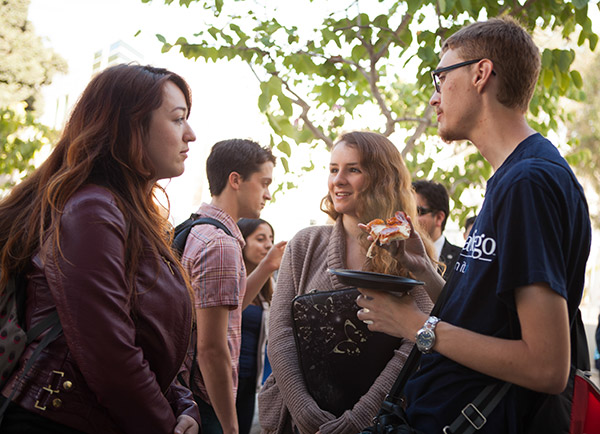
By:
- Erika Johnson
- Jade Griffin
Published Date
By:
- Erika Johnson
- Jade Griffin
Share This:

Kristin Olsen, California Assembly Minority Leader, discussed the role of social media in ethics. From left to right: Steve Erie, Kristin Olsen, Stephen Ferruolo, Robert Price, Scott Peters. Photo by Melissa Jacobs
Inspiring Political Engagement Among Students and Society
UC San Diego hosts Conference on Ethics, Transparency and Civility
Like any other successful relationship, political leaders and citizens must share accountability, offer truth and promote respect to maintain a healthy balance. A contract of consent is forged between public leaders and the people, promising policymaking that benefits society. What happens then when trust is tarnished and indifference sets in?
Last week, UC San Diego hosted the Conference on Ethics, Transparency and Civility on Oct. 16 to examine these qualities and how they affect society’s engagement—or lack thereof—in political and policy discussion. Drawing members of Congress, the California legislature and local government, as well as community leaders and students, panelists discussed ways to engage people, especially students, in political discourse and decision-making.
“We are proud to take the lead on promoting the principles of ethics, transparency and civility on our campus and in our society,” said Chancellor Pradeep K. Khosla. “As a student-centered, research-focused, service-oriented public university, it is our hope to foster discussions that will inspire current leaders, campus members and a younger generation to embrace and uphold these tenets in their careers and lives.”
The three-panel session was dominated by the dilemma of engagement, and how moral integrity, transparency and respectful dialogue all affect the public’s confidence in the leadership of their elected officials.

Students mingled with each other and panelists as part of a reception immediately after the conference. Photo by Melissa Jacobs
Panelists throughout the day agreed that, with few exceptions, most elected officials are working to make the best possible decisions to have a positive impact and benefit the American public.
“The vast majority of lawmakers are in it for the right reason,” said California Assembly Minority Leader Kristin Olsen. “With social media … there is so much more exposure of some of the things that do take place in the life of politics. For the most part it is a good thing. I think part of the reason ethics have increased in the walls of government is because of that transparency and that disclosure.”
Yet, Olsen suggested another result of our social media-driven world: “It is unfortunate when such a broad brush is painted over anyone who serves in public office because of a couple of scandals for several reasons,” she said. “One, it becomes more difficult to recruit people to public office. And, two, it becomes much more difficult to encourage voter engagement. It leads to apathy. It is incumbent upon all of us to work to together to increase public trust.”
Other panelists noted that leadership reports, whether delivered by the news media or in short clips online, are grossly pared down. Whereas the press is meant to be a watchdog, it can be lacking in substance, objectivity and truth. So what institutions can be relied upon to translate relevant information into the public knowledge? Perhaps the solution can come from a concentrated effort to educate the next generation about the power of their voice to enact change.
“When all else fails, I always go back to what can we do better with the next generation,” said former California Senate President pro Tempore Darrell Steinberg. “Number one, we must enhance and increase both civic education in middle and high school and we must change secondary school curriculum to make it more applied and experiential, including pathways in and around government and politics. Because unless young people get that spark, that same spark that I got at one point in my life…we’re not going to create those citizens who keep up and get engaged and get involved.”
UC San Diego student panelist and executive director of the Student Organized Voter Access Committee (SOVAC) Avril Prakesh, explained that while university students may not be paying as much attention to traditional communications vehicles such as television or radio, they are following Twitter, Facebook and other social media platforms to stay current on trending topics. “I think that the more you have politicians paying attention to issues that are important to students, the more students will pay attention,” said Prakesh.
Taking advantage of the online platform, UC San Diego student panelist Kyle Heiskala and recent grad Arshya Sharifian, ’13, successfully drew thousands of students to give feedback on important school issues through an interactive online application they co-founded called By the People. As part of the app, students can actively participate in the process of decision making, rather than simply learning the outcome afterwards.
“Transparency in a sense doesn’t go far enough because you need the engagement,” said Heiskala. “I do think information overload is a real problem... I think individuals feel overwhelmed and like they can’t have an impact—‘what can I do about it?’ If we can give people an opportunity to actually influence the outcome or feel like they are playing a role in the process, I think that will lead to the solution of the information overload.”
Increased information and transparency, while in theory a good idea, can also generate more conflicts in opinion. Panelists discussed the importance of respectful dialogue, even between disagreeing parties or opinions. “I really think we need to separate out the policy discussion versus the personal relationship,” said California Assemblymember Lorena Gonzalez. “I have personal relationships with a lot of people who I don’t agree with about everything. And I learn from that. We’ve got to get to a society where it’s okay when we disagree. When it gets personal, though, is when it is inappropriate.”
Steve Dinkin, director of the National Conflict Resolution Center, agreed, citing methods of communication that can help alleviate incivility. “People might have a different point of view, but we teach that the key is to acknowledge what the other person is saying. Acknowledgement doesn’t necessarily mean agreement. So people can have different perspective on a topic. They can acknowledge by listening, and still feel comfortable that they can hold their own position.”
The three 90 minute panels, which ran from 9 a.m. to 3:30 p.m., were followed by a reception with attendees including students, faculty and panelists. The day’s panelists included Congresswoman Susan Davis; Congressman Scott Peters; Senate President pro Tempore Darrell Steinberg; Senator Marty Block; Assembly Minority Leader Kristin Olsen; Assemblymember Lorena Gonzalez; Assemblymember Brian Jones; Assemblymember Brian Maienschein; Assemblymember Marie Waldron; San Diego City Council President Todd Gloria; Dan Wilcox, chief of staff for Assemblymember Adam Gray; Richard Barrerra, secretary-treasurer of San Diego and Imperial Counties Labor Council; Steven Dinkin, director of the National Conflict Resolution Center; Stephen Ferruolo, dean of the University of San Diego School of Law; Dan Howle, chair of the Independent Voter Project; Chad Peace, co-founder of the Independent Voter Project; Robert Price, chairman of the board of PriceSmart, Inc.; and Sam Schuchat, executive director of the California Coastal Conservancy.
The conference will air in its entirety on UCSD TV as part of a series beginning November 10 at 8 p.m. Videos will also be available online beginning November 7.
Share This:
You May Also Like
Stay in the Know
Keep up with all the latest from UC San Diego. Subscribe to the newsletter today.


